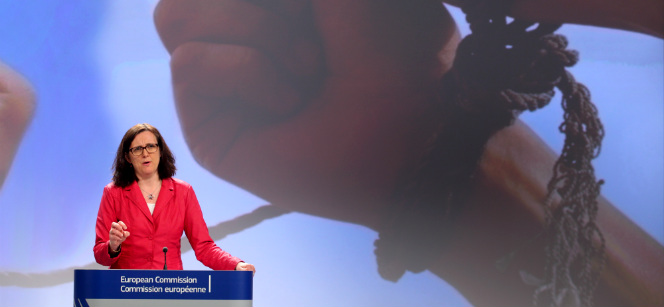


Accessibility tools
Service tools
Language selector
Navigation path
Left navigation
Additional tools
15 April 2013

23.632 people were identified or presumed victims of trafficking in the EU over the 2008-2010 period. This is the most striking figure emerging from the first report on trafficking in human beings in Europe, published on Monday by the European Commission. Despite this worrying background, to date, only 6 out of the 27 EU Member States have fully transposed the EU Anti-Trafficking Directive into their national legislation, with the deadline having expired on 6 April.
The report ![]() also highlights that the number of people being trafficked in and to the EU increased by 18% from 2008 to 2010, but less traffickers end up behind bars, since convictions decreased by 13% over the same period.
also highlights that the number of people being trafficked in and to the EU increased by 18% from 2008 to 2010, but less traffickers end up behind bars, since convictions decreased by 13% over the same period.
"It is difficult to imagine that in our free and democratic EU countries tens of thousands of human beings can be deprived of their liberty and exploited, traded as commodities for profit. But this is the sad truth and trafficking in human beings is all around us, closer than we think. I am very disappointed to see that, despite these alarming trends, only a few countries have implemented the anti-trafficking legislation and I urge those who have not yet done so to respect their obligations", said Cecilia Malmström, EU Commissioner for Home Affairs.
If the Directive is fully transposed, it has the potential to have concrete impact on the lives of the victims and to prevent others from falling victim to this crime. The new EU legislation covers actions in different areas such as criminal law provisions, prosecution of offenders, victims' support and victims' rights in criminal proceedings and prevention. It also foresees the establishment in each Member State of a national rapporteur or equivalent mechanism reporting on trends, gathering data and measure the impact of anti-trafficking activities. To date six Member States (Czech Republic, Latvia, Finland, Hungary, Poland and Sweden) have notified full transposition of the EU Directive against trafficking in human beings, whose deadline for implementation expired on 6 April.
The total number of identified and presumed victims was 6,309 in 2008; 7795 in 2009 and 9,528 in 2010, with an increase of 18% over the 3 reference years. The profile of victims by gender and age in the three reference years was 68% women, 17% men, 12% girls and 3% boys. The majority of the identified and presumed victims are trafficked for sexual exploitation (62%). Trafficking for forced labour (25%) comes second and trafficking in other forms such as trafficking for the removal of organs, for criminal activities or for selling of children follow with smaller percentages (14%). Most victims detected in EU Member States are citizens from Romania and Bulgaria. Most victims having citizenship outside of the EU Member States are from Nigeria and China. The total number of convictions for trafficking in human beings decreased by 13% from 2008 to 2010.
The European Commission is also presenting an overview of the rights of the victims of trafficking in human being to provide clear, user-friendly information on the labour, social, residence and compensation rights individuals are entitled to under EU law.
Questions and answers about the study, Cecilia Malmström's speech, an infographic about victims and the full statistical report ![]() released this week. The overview of victims' rights is available here. Photos and video from Cecilia Malmström's press conference can be downloaded from the audiovisual portal of the European Commission.
released this week. The overview of victims' rights is available here. Photos and video from Cecilia Malmström's press conference can be downloaded from the audiovisual portal of the European Commission.